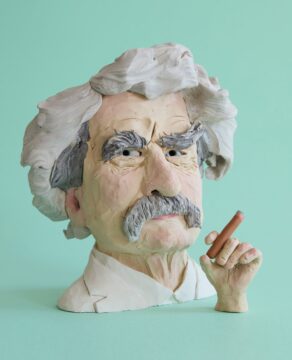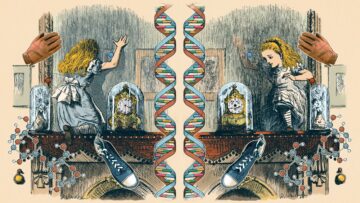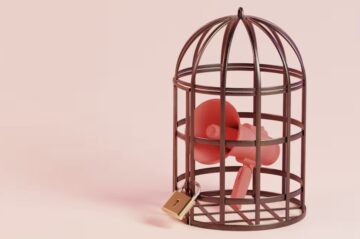Michael Dirda in the Washington Post:
 It’s said that when “War and Peace” was finished and about to be published, Tolstoy looked at the huge book and suddenly exclaimed, “The yacht race! I forgot to put in the yacht race!” At 1,174 pages, Ron Chernow’s “Mark Twain” is essentially the same length as “War and Peace,” but seemingly nothing has been overlooked or left out. Normally, this would be a signal weakness in a biography — shape and form do matter — but Chernow writes with such ease and clarity that even long sections on, say, Twain’s business ventures prove horribly fascinating as the would-be tycoon descends, with Sophoclean inexorability, into financial collapse and bankruptcy.
It’s said that when “War and Peace” was finished and about to be published, Tolstoy looked at the huge book and suddenly exclaimed, “The yacht race! I forgot to put in the yacht race!” At 1,174 pages, Ron Chernow’s “Mark Twain” is essentially the same length as “War and Peace,” but seemingly nothing has been overlooked or left out. Normally, this would be a signal weakness in a biography — shape and form do matter — but Chernow writes with such ease and clarity that even long sections on, say, Twain’s business ventures prove horribly fascinating as the would-be tycoon descends, with Sophoclean inexorability, into financial collapse and bankruptcy.
Overall, Chernow’s “Mark Twain” is less a literary biography than a deep dive into “the most original character in American history.” Born in 1835, Samuel Langhorne Clemens, who adopted the pen name Mark Twain, was by turns a printer, steamboat pilot, journalist, stand-up storyteller, best-selling author, publisher, political pundit, champion of racial equality and all-around scourge of authoritarianism.
More here. [Free registration required.]
Enjoying the content on 3QD? Help keep us going by donating now.

 Capuchin monkeys on a remote Panamanian island are abducting babies from howler monkey families, in a first-of-its-kind trend.
Capuchin monkeys on a remote Panamanian island are abducting babies from howler monkey families, in a first-of-its-kind trend. On February 24, 1947, Eugene Le Bar began a bus trip from Mexico City that would take him to New York. By March 1, when he arrives in New York he was not feeling very well but went sightseeing nonetheless, coming in contact with lots of people. On March 10, he died in Willard Parker hospital from the rare but extremely deadly hemorrhagic smallpox. Only five percent of smallpox cases take this intensely virulent form, so it is not surprising that Le Bar’s case was originally misdiagnosed. Overall, twelve persons were infected with traditional, not hemorrhagic, smallpox (with a much higher survival rate) from Le Bar’s ring of contacts; two died. The infection rate was low because New York embarked on a mass vaccination effort to prevent the spread of the disease. Six million New Yorkers were vaccinated against smallpox in the spring of 1947, an enormous accomplishment by the local public health service employees and hospital personnel as shots were given around the clock to prevent an epidemic.
On February 24, 1947, Eugene Le Bar began a bus trip from Mexico City that would take him to New York. By March 1, when he arrives in New York he was not feeling very well but went sightseeing nonetheless, coming in contact with lots of people. On March 10, he died in Willard Parker hospital from the rare but extremely deadly hemorrhagic smallpox. Only five percent of smallpox cases take this intensely virulent form, so it is not surprising that Le Bar’s case was originally misdiagnosed. Overall, twelve persons were infected with traditional, not hemorrhagic, smallpox (with a much higher survival rate) from Le Bar’s ring of contacts; two died. The infection rate was low because New York embarked on a mass vaccination effort to prevent the spread of the disease. Six million New Yorkers were vaccinated against smallpox in the spring of 1947, an enormous accomplishment by the local public health service employees and hospital personnel as shots were given around the clock to prevent an epidemic. Molecules in urine and blood can reveal how much of a person’s diet comes from ultra-processed foods, according to a study published in PLOS Medicine today
Molecules in urine and blood can reveal how much of a person’s diet comes from ultra-processed foods, according to a study published in PLOS Medicine today A novel about a Palestinian woman who participates in a pyramid scheme reselling Birkin bags has won this year’s Swansea University
A novel about a Palestinian woman who participates in a pyramid scheme reselling Birkin bags has won this year’s Swansea University  The announcement last week that a nine-month-old baby in Philadelphia has been cured of a rare genetic disorder by gene editing is a great moment in medical history. For the first time, doctors have altered a gene inside many cells in the liver of a living human being using CRISPR, the molecular tool borrowed from microbes that can
The announcement last week that a nine-month-old baby in Philadelphia has been cured of a rare genetic disorder by gene editing is a great moment in medical history. For the first time, doctors have altered a gene inside many cells in the liver of a living human being using CRISPR, the molecular tool borrowed from microbes that can  Ideally, policy and program design is a straightforward process: a decision-maker faces a problem, turns to peer-reviewed literature, and selects interventions shown to work. In reality, that’s rarely how things unfold. The popularity of “evidence-based medicine” and other “evidence-based” topics highlights our desire for empirical approaches — but would the world actually improve if those in power consistently took social science evidence seriously? It brings me no joy to tell you that, at present, I think the answer is usually “no.”
Ideally, policy and program design is a straightforward process: a decision-maker faces a problem, turns to peer-reviewed literature, and selects interventions shown to work. In reality, that’s rarely how things unfold. The popularity of “evidence-based medicine” and other “evidence-based” topics highlights our desire for empirical approaches — but would the world actually improve if those in power consistently took social science evidence seriously? It brings me no joy to tell you that, at present, I think the answer is usually “no.” It was the finger seen around the world. In 2008, archaeologists working in Denisova Cave in southern Siberia, Russia, uncovered a tiny bone: the tip of the little finger of an
It was the finger seen around the world. In 2008, archaeologists working in Denisova Cave in southern Siberia, Russia, uncovered a tiny bone: the tip of the little finger of an  Art criticism is thriving. It’s taking on new forms, shedding old skin, and adapting to novel venues. It’s as alive and relevant as ever, still generating conversation and controversy. Instead of fizzling out, it’s being embraced by new generations of critics, whether in these pages or on Substack, Instagram, YouTube, and TikTok (no matter the platform, it always comes down to writing). It’s a buzzing genre that attracts readers of all ages, from septum-pierced college students to cigar-puffing art collectors.
Art criticism is thriving. It’s taking on new forms, shedding old skin, and adapting to novel venues. It’s as alive and relevant as ever, still generating conversation and controversy. Instead of fizzling out, it’s being embraced by new generations of critics, whether in these pages or on Substack, Instagram, YouTube, and TikTok (no matter the platform, it always comes down to writing). It’s a buzzing genre that attracts readers of all ages, from septum-pierced college students to cigar-puffing art collectors. After her adventures in Wonderland, the fictional Alice stepped through the mirror above her fireplace in Lewis Carroll’s 1871 novel Through the Looking-Glass to discover how the reflected realm differed from her own. She found that the books were all written in reverse, and the people were “living backwards,” navigating a world where effects preceded their causes.
After her adventures in Wonderland, the fictional Alice stepped through the mirror above her fireplace in Lewis Carroll’s 1871 novel Through the Looking-Glass to discover how the reflected realm differed from her own. She found that the books were all written in reverse, and the people were “living backwards,” navigating a world where effects preceded their causes. For much of the 20th century, young Americans were seen as free speech’s fiercest defenders. But now, young Americans are growing more skeptical of free speech.
For much of the 20th century, young Americans were seen as free speech’s fiercest defenders. But now, young Americans are growing more skeptical of free speech. Meet my patient Mrs. L. R. She’s 98 years young and has never suffered a day of serious illness in her long life. She was referred to me by her primary care physician to assess her
Meet my patient Mrs. L. R. She’s 98 years young and has never suffered a day of serious illness in her long life. She was referred to me by her primary care physician to assess her  It was a cold, gray afternoon in December, and at the American Museum of Natural History, a half million leaf-cutter ants were hunkered down in their homes. The ants typically spend their days harvesting slivers of leaves, which they use to grow expansive fungal gardens that serve as both food and shelter. On many days, visitors to the
It was a cold, gray afternoon in December, and at the American Museum of Natural History, a half million leaf-cutter ants were hunkered down in their homes. The ants typically spend their days harvesting slivers of leaves, which they use to grow expansive fungal gardens that serve as both food and shelter. On many days, visitors to the